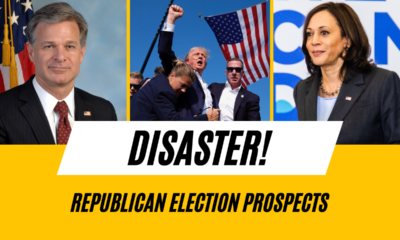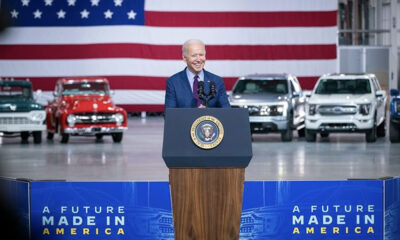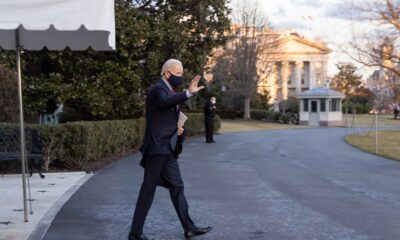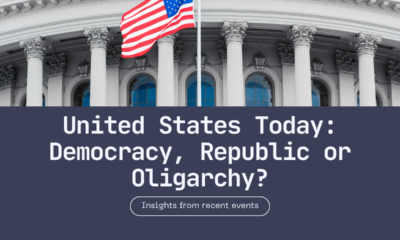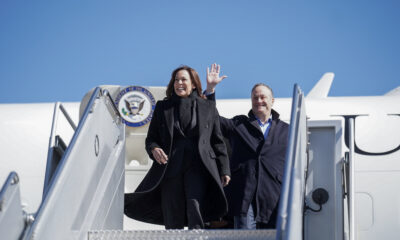Civilization
We Still Need Smith. But Do We Want Him (or Her)?
James Stewart’s iconic character, Senator Jefferson Smith, still has his appeal – but currently not enough to win commanding majorities.
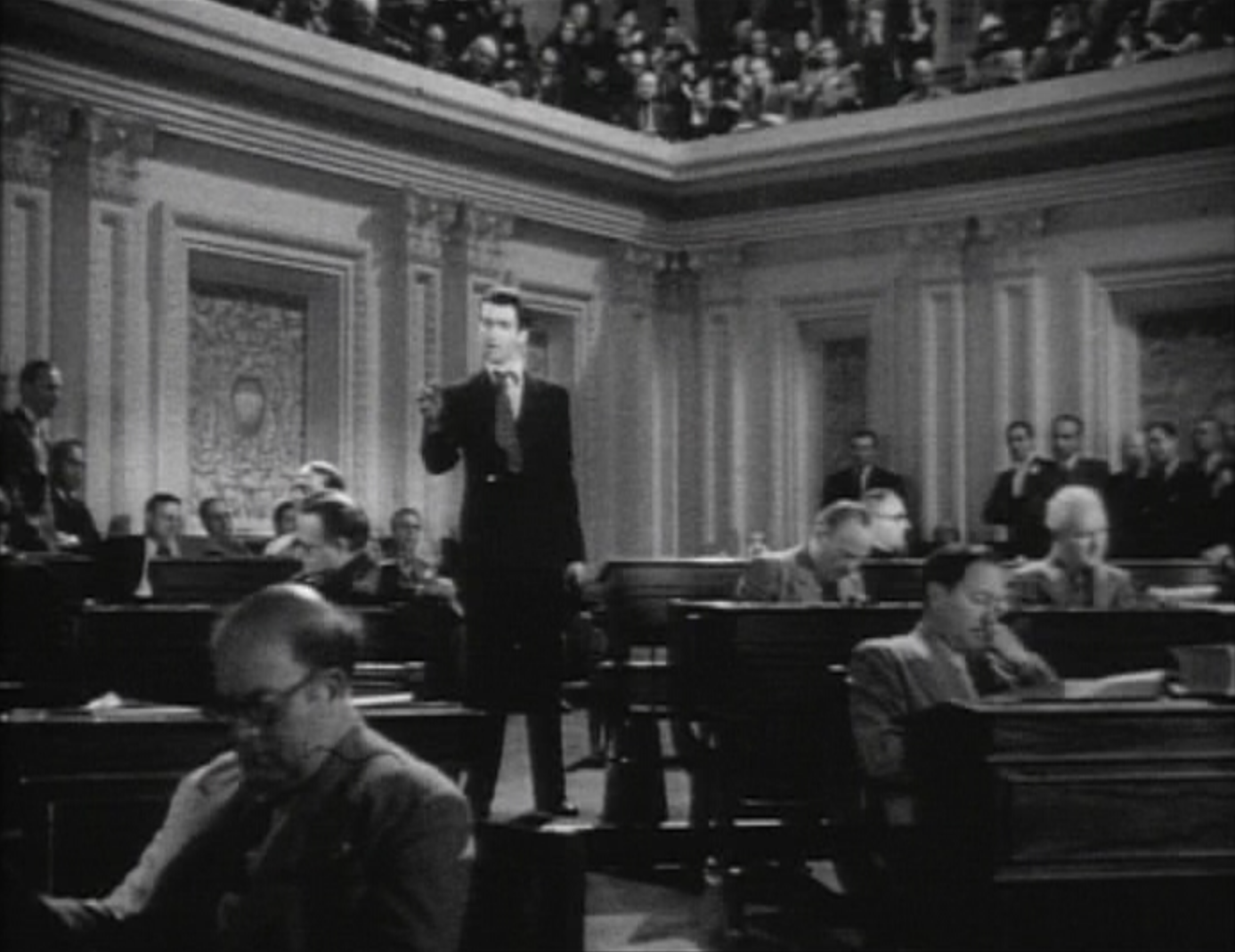
Forty years ago, a young pollster and political savant who’d helped Jimmy Carter navigate his way into the White House, had an epiphany: The nation’s two major political parties were not giving the American people the kind of candidates they really wanted in a president.
The pollster’s name was Patrick Caddell, and in 1984 he was half right. Republicans certainly had a party leader with star quality. Ronald Reagan was literally a former movie star who’d gone on to serve two terms as California’s governor, one term as president of the United States, and was on the verge of a 49-state reelection landslide. It was the Democrats who seemed rudderless. But Pat Caddell was still a Democrat then, so his angst made sense.
In the 1980 campaign, Caddell had a different reaction than most to Reagan’s one-line rebuke of President Carter’s first four years in office. “Are you better off today than you were four years ago?” Reagan asked voters in a presidential debate. Pundits and political professionals gave this line high marks. Caddell found it off-putting. He thought it appealed to Americans’ self-interest, not their patriotism.
Pat Caddell preferred John F. Kennedy’s evocative inaugural address formulation: “Ask not what your country can do for you. Ask what you can do for your country.” This sentiment, Caddell believed, was a nobler expression of our national spirit.
So he did in-depth polling designed to find how his party might field candidates more closely aligned with Americans’ better angels. In a subsequent 150-page memo, Caddell conjured up the perfect candidate – at least on paper. He gave him a name, too: “Senator Smith.”
The inspiration was “Mr. Smith Goes to Washington,” Frank Capra’s 1939 classic Hollywood morality tale starring Jimmy Stewart as Jefferson Smith, a noble public servant who valued shared sacrifice, was utterly uncorruptible, and who had gone into politics to serve others, not to stroke his ego or kowtow to party bosses and special interests.
“Senator Smith” polled well – and has ever since. Although Caddell died five years ago, in January 2019, well-regarded Democratic pollster John Della Volpe, who was then doing original surveys for RealClearPolitics, re-polled Caddell’s original 100-question survey as part of the “Smith Project.” What he found was that voters’ desire for a principled independent in the White House had only grown since the 1980s. Fully 84% of Americans agreed with this statement:
The country is run by an alliance of incumbent politicians, media pundits, lobbyists, and other powerful money interest groups for their own gain at the expense of the American people.
“The American electorate is discontented with its choices and constrained by conventional wisdom into thinking there’s not much they can do about it,” Della Volpe wrote at the time. “But their hopes remain.”
But what can they do about it? In 2024, the apparent choice is between two presidential nominees whom majorities in their own parties did not want to run. Incumbency has proven a more potent force than voters’ aspirations, however. President Biden’s mere presence in the race discouraged any Democrat with a national following from even mentioning a desire to challenge him. Donald Trump, running as a de facto incumbent, refused to even debate his Republican opponents, and is cruising to the nomination.
So what can rank-and-file voters do about it? Progressives in some states will have the option of voting for Jill Stein on the Green Party ticket, or Cornel West, an eloquent left-wing college professor. Such challengers are usually dismissed as “fringe” candidates, although Stein and West are both serious people.
Robert F. Kennedy Jr. has a dynastic name. He’s the namesake of martyred 1968 Democratic presidential candidate Bobby Kennedy and the nephew of Pat Caddell’s boyhood hero, John F. Kennedy. But RFK Jr. lacks the charisma of his father and uncle, doesn’t have the backing of his own family, and is burdened by problematic past statements about vaccines that make him sound like a conspiracy theorist. As if that wasn’t enough baggage, he also suffers from spasmodic dysphonia, which makes him sound old and feeble – negating the great Kennedy talent for oratory. Yet, with all that baggage, RFK Jr. is still a factor. In most five-way polls, Kennedy tallies 14% or 15% of the vote.
Democrats are alarmed by those numbers, as they should be, especially since RFK Jr. is qualifying for the ballot in swing states such as Arizona and Georgia. Democrats are particularly chagrined at No Labels, a centrist group that is poised to field a “unity” ticket comprising some combination of a moderate Democrat, a moderate Republican, or an independent. This is the potential vehicle for “Senator Smith,” but who would that be? Names mentioned so far include Democrat Joe Manchin and independent Kyrsten Sinema, along with “Never Trump” maven Liz Cheney and centrist or center-right Republicans Larry Hogan, Mitt Romney, Condoleezza Rice, and Nikki Haley.
Haley is the most recent, and the most intriguing, addition to the list. But all these candidates have baggage, most notably the perception that they are repackaged, Washington establishment partisans masquerading as something different. A Schoen Cooperman Research poll shows that clearly. Haley arguably avoids the Washington, D.C., stain, but her drawbacks may be the most disqualifying: A majority of states have some form of “sore loser” laws on the books, prohibitions against running twice in the same year for the same office that may keep her off the November ballot.
It’s not clear that recycled politicians are what Americans disillusioned by the two dominant parties are looking for, which is why some pundits have floated names such as Dwayne “The Rock” Johnson or Matthew McConaughey. That impulse is not as fanciful as it sounds, judging by the latest iteration of the “We Need Smith” polling. Done in late January by Schoen Cooperman, and made available to RealClearPolitics, the survey shows the following:
- In a mock three-way trial heat, “Candidate Smith” trails Trump (36%) and Biden (32%), but at 19% he tallies more than Romney or Manchin put together.
- That 19% figure, if it held up, would put “Smith” on the debate stage, according to the threshold set by the Commission on Presidential Debates.
- The new poll also suggests that Candidate Smith would benefit from such national exposure because his “favorable” rating is twice as high as either Trump or Biden.
- So why doesn’t Smith do better in the head-to-head? The likely reason is that the Democratic Party-GOP duopoly still has a firm grip on Americans’ imaginations – what they think is politically possible. Here’s the proof: When shown this statement, “Voting for an independent candidate is wasting my vote,” 58% of people in the Schoen Cooperman poll agreed.
- And although 60% of respondents said they would consider belonging to a third party, it came with a key qualification. The question was asked this way: “I am so dissatisfied with Democrats and Republicans that I would join a third party if it had a chance of success.” Considering that the last time a third-party candidate won the presidency was 1860, that language – “if it had a chance of success” – is a significant caveat.
All that said, disillusionment with the current state of the nation’s politics runs deep. Here are some data points in the new “Smith” poll that reveal just how much the entrenched political system has alienated the American people:
“The power of ordinary people to control our country is getting weaker every day as political leaders on both sides fight to protect their own power and privilege at the expense of the nation’s well-being. We need to restore what we really believe in: real democracy by the people.” Nearly nine in 10 Americans agree with that, statement, 56% “strongly” and 31% “somewhat.”
Likewise, three in four Americans agree “strongly” or “somewhat” with this statement: “Powerful interests from Wall Street banks to corporations, unions and political interest groups have used campaign and lobbying money to rig the system for themselves.”
What all these findings indicate is that Americans are open to the third-party or independent ticket gambit, but that they would have to be convinced pretty early in the game that a “unity ticket” was viable – that it could actually win. A critical mass of voters is not interested in sending a message and would flock to it only if they thought it could really win.
“Our polling shows clearly the strong desire of the electorate for a fresh face and a new direction from an independent candidate,” Doug Schoen told RCP. “That was the case in 1992 when Ross Perot ran and got almost 20% and the same appears to be the case now.”
But the fact that U.S. politics has been swept up in America’s current celebrity-driven culture makes things trickier for a good-government group like No Labels.
Moreover, even though Doug Schoen’s poll tested negative messages likely to be used against Senator Smith, a candidate on paper has advantages that a flesh and blood candidate may not. This is what an actual Democratic senator was alluding to 40 years ago when he was first shown Pat Caddell’s research.
“God, I wish I knew Senator Smith!” this 42-year-old Democrat quipped to The New Republic in early 1984. “He’s a helluva guy.”
That real-life senator was Joe Biden, the man whom Caddell first envisioned as the template for Smith. It turned out not to be a good fit – for Biden or for Caddell, who found his man in Gary Hart, who ran in 1984 and was poised for another run in 1988 when he was derailed over other issues.
In a further twist, Pat Caddell ended up as an independent. “I didn’t leave the Democratic Party,” Caddell told me and others. “The Democratic Party left me.” Why is that ironic? Because it’s the word-for-word explanation Ronald Reagan gave for his own political evolution. And Reagan was the candidate (and personal friend of Jimmy Stewart) who launched the quest to find Candidate Smith. They don’t come along every day, but what the last Smith poll suggests is that finding one needs the casting of a very wide net.
This article was originally published by RealClearPolitics and made available via RealClearWire.
Carl M. Cannon is the Washington Bureau Chief of RealClearPolitics and Executive Editor of RealClear Media Group. Carl is a past recipient of the Gerald R. Ford Journalism Prize for Distinguished Reporting and the Aldo Beckman Award, the two most prestigious awards for White House coverage. Previous positions include executive editor of PoliticsDaily.com, D.C. bureau chief for Reader's Digest and White House correspondent for both the Baltimore Sun and National Journal. He was a 2007 fellow-in-residence at Harvard University's Institute of Politics, a past president of the White House Correspondents’ Association, and is a published author.
-

 Executive4 days ago
Executive4 days agoSecret Service chief gets no solace
-

 Executive3 days ago
Executive3 days agoWaste of the Day: Louisville Taxpayers Pay Nearly $600,000 For Empty Building’s Maintenance, Security
-

 Guest Columns4 days ago
Guest Columns4 days agoFear Itself: Democrats’ Favorite Strategy Caused Their Current Chaos
-

 Executive3 days ago
Executive3 days agoWhere is Joe Biden – or Jill?
-

 Executive1 day ago
Executive1 day agoWaste of the Day: Throwback Thursday: Cities Used Crime Prevention Funds on Soccer Games, Paper Shredding
-

 Executive2 days ago
Executive2 days agoFacile and politically motivated suggestions
-

 Civilization5 days ago
Civilization5 days agoBuild Iron Dome in the United States To Prepare for Israel’s Worst Day
-

 Executive4 days ago
Executive4 days agoThe Emerging GOP Plan To Beat Kamala Harris



